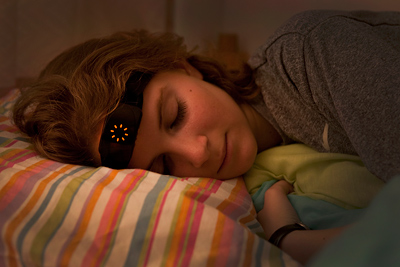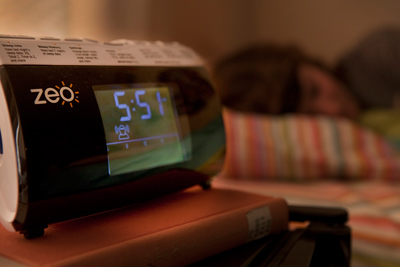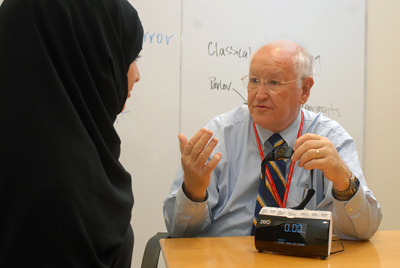Psych students sleep for science with high-tech headbands
By Lauren Gold


Back in high school, Brittany Jaso '13 didn't get much sleep.
"I was on the track team, so I would stay late at practice, then I'd be up late doing work -- then I'd have to get up really early. So, my sleep schedule was horrible," she said.
College started out pretty much the same way. Until about week four of her Psych 101 class.
Jaso is one of 320 students in the 1,200-student class taking part in the largest-ever objective study of the sleep patterns of individual college students -- a demographic that sleep researcher Jim Maas, professor of psychology and Stephen H. Weiss Presidential Fellow, calls "perhaps the most sleep-deprived segment of our population."
Maas' study has two goals: to provide baseline data on how much and how well students sleep; and to test whether Psych 101 students improve their sleep habits after learning about the importance of sleep.
Past objective sleep studies have required subjects to be wired with electrodes in a sleep lab and monitored overnight. Maas' research takes advantage of a new technology, the Zeo Personal Sleep Coach, which uses a small headband sensor to measure students' sleep patterns in the comfort of their own dorm rooms.
The idea for the study came last spring when Maas, working with Rebecca Robbins '09 on a new book about sleep devices, approached Zeo Inc. to find out more about the technology. Subsequent discussions led the company to loan Maas 450 of the $249 units for the fall semester.
In Ithaca, 320 students collected their Zeos Sept. 2; 58 students at Weill Cornell Medical College in Qatar, where all premedical students take Maas' class, got theirs a few days later. Participants receive a point of extra credit for taking part -- along with a chance to win their own Zeo through several competitions throughout the semester.
The Zeo measures time spent awake or in deep, light and REM sleep during the night; it then provides a "ZQ" score based on the quantity and quality of each night's sleep. "It's pretty interesting -- you get to really understand your sleep personality," said Gerra Goff '13.
The Zeo also gives concrete feedback on how factors like eating a big meal right before bed or drinking caffeine or alcohol affect that night's rest.

"Eating a bunch of fried food really kills your sleep score," added freshman Ben Chamberlain. "The big thing it's taught me is that the last three hours before you go to bed have big influence in how good your sleep is. Now that I have seen what goes on, what leads to a good sleep score, I definitely have tried to sleep more soundly and better."
From Doha, the reactions to the Zeo have been similar.
"One thing I realized, and I think it's really important, is that even if we stay up late studying and working for many hours, we won't be providing the best health care to our patients because our brains just won't be functioning well," said Nour Barakat, a WCMC-Q second-year pre-med in the study.
Results from the study, which ends later this month, will tell Maas if his lectures on the importance of sleep are changing behaviors. For Jaso, the answer is yes.
"Some nights, I couldn't help it -- I had to stay up late," she said. "But some of the things he told us -- that more sleep is more productive during the day -- I've tried to incorporate that, and I think he's right. I feel myself just doing better and paying more attention in class.
"Now it's a conscious effort," she added. "If I'm at the library and it's late at night, I'll say, I need to stop and go back and sleep."
Media Contact
Get Cornell news delivered right to your inbox.
Subscribe